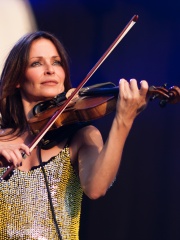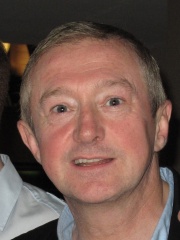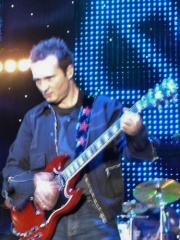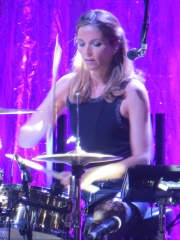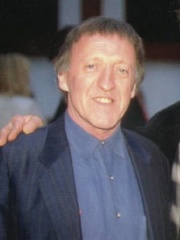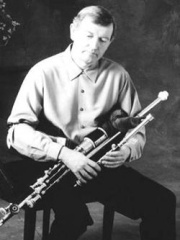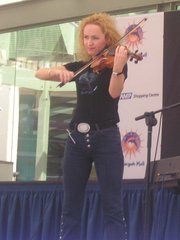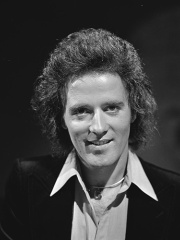

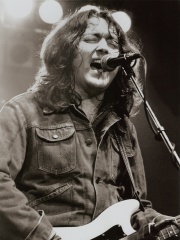
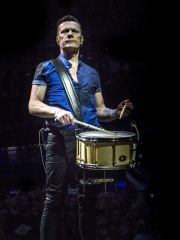

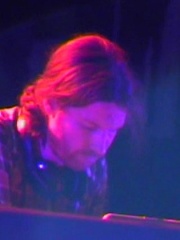
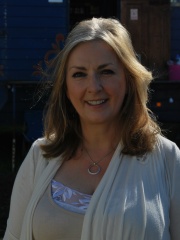
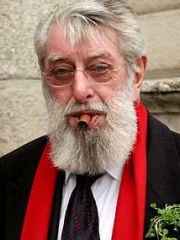
The Most Famous
MUSICIANS from Ireland
Top 10
The following people are considered by Pantheon to be the top 10 most legendary Irish Musicians of all time. This list of famous Irish Musicians is sorted by HPI (Historical Popularity Index), a metric that aggregates information on a biography's online popularity. Visit the rankings page to view the entire list of Irish Musicians.

1. Gilbert O'Sullivan (b. 1946)
With an HPI of 69.06, Gilbert O'Sullivan is the most famous Irish Musician. His biography has been translated into 24 different languages on wikipedia.
Raymond Edward O'Sullivan (born 1 December 1946), known professionally as Gilbert O'Sullivan, is an Irish singer-songwriter who achieved his most significant success during the early 1970s with hits including "Alone Again (Naturally)", "Clair" and "Get Down". His songs are often marked by his distinctive percussive piano playing style and observational lyrics using word play. Born in Waterford, Ireland, O'Sullivan settled in Swindon, England, as a child. In 1967, he began pursuing a career in music. Worldwide, he has charted 16 top 40 records, including six No. 1 songs, the first of which was 1970's "Nothing Rhymed". Across his career, he has recorded 19 studio albums. The music magazine Record Mirror voted O'Sullivan the top UK male singer of 1972. He has received three Ivor Novello Awards, including "Songwriter of the Year" in 1973, and received praise from fellow musicians Nina Simone, Paul Weller, Gary Barlow, and Tim Burgess.

2. Bono (b. 1960)
With an HPI of 67.39, Bono is the 2nd most famous Irish Musician. His biography has been translated into 74 different languages.
Paul David Hewson (born 10 May 1960), known by the nickname Bono ( BON-oh), is an Irish singer-songwriter and activist. He is a founding member, the lead vocalist, and primary lyricist of the rock band U2. Bono is known for his impassioned vocal style as well as his grandiose songwriting and performance style. His lyrics frequently include social and political themes, and religious imagery inspired by his Christian faith. Born and raised in Dublin, Ireland, he attended Mount Temple Comprehensive School where in 1976 he began dating his future wife, Alison Stewart, as well as forming, with schoolmates, the band that became U2. During U2's early years, Bono's lyrics contributed to the group's rebellious and spiritual tone. As the band matured, his lyrics became inspired more by personal experiences shared with the other members. As a member of U2, Bono has received 22 Grammy Awards and has been inducted into the Rock and Roll Hall of Fame. Aside from his music, Bono is an activist for social justice causes, both through U2 and as an individual. He is particularly active in campaigning to fight extreme poverty and HIV/AIDS in Africa, for which he co-founded DATA, EDUN, the ONE Campaign, and Product Red. In pursuit of these causes, he has participated in benefit concerts and lobbied politicians and heads of state for relief. Bono has received numerous honours for his philanthropic efforts, including being named one of the Time Persons of the Year in 2005, being granted an honorary knighthood by Elizabeth II of the United Kingdom in 2007, being made a Commandeur of the French Ordre des Arts et des Lettres (Order of Arts and Letters) in 2013, and receiving the Presidential Medal of Freedom in the United States in 2025. Bono has also attracted criticism for bypassing African businesses in his activist efforts and for tax avoidance in his personal finances. Outside the band, he has recorded with numerous artists. He has collaborated with U2 bandmate the Edge on several projects, including: songs for Roy Orbison, Tina Turner, and Martin Garrix; and the soundtracks to the musical Spider-Man: Turn Off the Dark and a London stage adaptation of A Clockwork Orange. In business, he invested in the refurbishment of the Clarence Hotel in Dublin, and was managing director and a managing partner of the private equity firm Elevation Partners, which invested in several companies.

3. Rory Gallagher (1948 - 1995)
With an HPI of 67.26, Rory Gallagher is the 3rd most famous Irish Musician. His biography has been translated into 40 different languages.
William Rory Gallagher ( GAL-ə-hər; 2 March 1948 – 14 June 1995) was an Irish musician, singer, and songwriter. Regarded as "Ireland's first rock star", he is known for his virtuosic style of guitar playing and live performances. He has sometimes been referred to as "the greatest guitarist you've never heard of". Gallagher gained international recognition in the late 1960s as the frontman and lead guitarist of the blues rock power trio Taste. Following the band's break-up in 1970, he launched a solo career and was voted Guitarist of the Year by Melody Maker magazine in 1972. Gallagher played over 2,000 concerts worldwide throughout his career, including many in Northern Ireland during the Troubles. He had global record sales exceeding 30 million. During the 1980s, Gallagher continued to tour and record new music, but his popularity declined due to shifting trends in the music industry. His health also began to deteriorate, resulting in a liver transplant in March 1995 at King's College Hospital in London. Following the operation, he contracted a staphylococcal infection (MRSA) and died three months later at the age of 47. Gallagher has been commemorated posthumously with statues in Ballyshannon and Belfast, and public spaces renamed in his memory in Dublin, Cork, and Paris. He has been commemorated on an An Post set of postage stamps and a Central Bank of Ireland commemorative coin. Since 2002, the Rory Gallagher International Tribute Festival has been held annually in Ballyshannon. A number of musicians in the world of rock and blues cite Gallagher as an influence, both for his musicianship and character, including Brian May (Queen), Johnny Marr (the Smiths), Slash (Guns N' Roses), the Edge (U2), Glenn Tipton (Judas Priest), Janick Gers (Iron Maiden), Vivian Campbell (Def Leppard), Joan Armatrading, Gary Moore, and Joe Bonamassa.

4. Larry Mullen Jr. (b. 1961)
With an HPI of 66.55, Larry Mullen Jr. is the 4th most famous Irish Musician. His biography has been translated into 37 different languages.
Laurence Joseph Mullen Jr. (; born 31 October 1961) is an Irish musician, best known as the drummer and co-founder of the rock band U2. A member of the band since its inception, he has recorded 15 studio albums with U2. Mullen's distinctive, almost military drumming style developed from his playing martial beats in childhood marching bands. Mullen was born in Dublin, where he attended Mount Temple Comprehensive School. In 1976, he co-founded U2 after posting a message on the school's notice board in search of musicians. Mullen has worked on numerous side projects during his career. In 1990, he produced the Ireland national football team's song "Put 'Em Under Pressure" for the 1990 FIFA World Cup. In 1996, he worked with U2 bandmate Adam Clayton on a dance re-recording of the "Theme from Mission: Impossible". He has also collaborated with musicians such as Maria McKee, Nanci Griffith, Emmylou Harris, and Alice Cooper. Mullen has sporadically acted in films, most notably in Man on the Train (2011) and A Thousand Times Good Night (2013). Mullen has received 22 Grammy Awards and has been inducted into the Rock and Roll Hall of Fame. In 2016, Rolling Stone ranked Mullen the 96th-greatest drummer of all time.
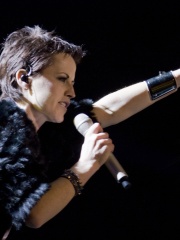
5. Dolores O'Riordan (1971 - 2018)
With an HPI of 66.52, Dolores O'Riordan is the 5th most famous Irish Musician. Her biography has been translated into 67 different languages.
Dolores Mary Eileen O'Riordan ( oh-REER-dən; 6 September 1971 – 15 January 2018) was an Irish musician and singer-songwriter who achieved international fame as the lead vocalist of the rock band the Cranberries. O'Riordan was the principal songwriter of the band, and additionally performed acoustic and electric guitars. She became one of the most recognisable voices in alternative rock, and was known for her lilting mezzo-soprano voice, signature yodel, use of keening, and strong Limerick accent. O'Riordan was born in County Limerick, Ireland, to a Catholic working-class family. She began performing as a soloist in her church choir before leaving secondary school to join the Cranberries in 1990. The band released the number-one Everybody Else Is Doing It, So Why Can't We? (1993), No Need to Argue (1994), To the Faithful Departed (1996), and Bury the Hatchet (1999). The Cranberries released their fifth album, Wake Up and Smell the Coffee (2001), before going on hiatus in 2003. During this time, O'Riordan released two solo studio albums: Are You Listening? (2007) and No Baggage (2009). The Cranberries reunited in 2009, released Roses (2012), and went on a world tour. O'Riordan's other activities included appearing as a judge on RTÉ's The Voice of Ireland (2013–2014) and recording material with the trio D.A.R.K. (2014). The Cranberries' seventh album, Something Else (2017), was the last to be released during her lifetime. Throughout her life, O'Riordan suffered from depression and the pressure of her own success; she was diagnosed with bipolar disorder in 2015. She died from drowning due to alcohol intoxication in January 2018. After her death, the Cranberries released the Grammy-nominated album In the End (2019), featuring her final vocal recordings, and then disbanded. With the Cranberries, O'Riordan sold more than 40 million albums worldwide during her lifetime; that total increased to almost 50 million albums worldwide as of 2019, excluding her solo albums. She was honoured with the Ivor Novello International Achievement award, and in the months following her death, she was named "The Top Female Artist of All Time" on Billboard's Alternative Songs chart.

6. Sally Oldfield (b. 1947)
With an HPI of 59.98, Sally Oldfield is the 6th most famous Irish Musician. Her biography has been translated into 21 different languages.
Sally Patricia Oldfield (born 3 August 1947) is an English singer-songwriter. She is the sister of composers Mike and Terry Oldfield.

7. Aphex Twin (b. 1971)
With an HPI of 58.99, Aphex Twin is the 7th most famous Irish Musician. His biography has been translated into 48 different languages.
Richard David James (born 18 August 1971), known professionally under many different names, but most famously as Aphex Twin, is a British musician, composer and DJ active in electronic music since 1988. His idiosyncratic work has drawn on many styles, including techno, ambient, acid, and jungle, and he has been described as a pioneering figure in the intelligent dance music (IDM) genre. Journalists from publications including Mixmag, The New York Times, NME, Fact, Clash and The Guardian have called James one of the most influential and important artists in contemporary electronic music. James was raised in Cornwall and began DJing at free parties and clubs around the South West in the late 1980s. His debut EP Analogue Bubblebath, released in 1991 on Mighty Force Records, brought James an early following; he began to perform across the UK and continental Europe. James co-founded the independent label Rephlex Records the same year. His 1992 debut album Selected Ambient Works 85–92, released by Belgian label Apollo, garnered wider critical and popular acclaim. James signed to Warp in late 1992 and subsequently released charting albums such as ...I Care Because You Do (1995) and Richard D. James Album (1996), as well as Top 40 singles such as "Come to Daddy" (1997) and "Windowlicker" (1999); the latter two were accompanied by music videos directed by Chris Cunningham and brought James wider international attention. After releasing Drukqs in 2001 and completing his contract with Warp, James spent several years releasing music on his own Rephlex label, including the 2005 Analord EP series under his AFX alias and a pair of 2007 releases as the Tuss. In 2014 he made available a previously unreleased 1994 LP as Caustic Window. He returned later that year with the Aphex Twin album Syro on Warp, winning the Grammy Award for Best Dance/Electronic Album. He has since released charting EPs including Cheetah (2016) and Collapse (2018). His 2023 single "Blackbox Life Recorder 21f" was nominated for the Grammy Award for Best Dance/Electronic Recording. Since 2015 he has been sporadically releasing music on SoundCloud.

8. Moya Brennan (b. 1952)
With an HPI of 58.33, Moya Brennan is the 8th most famous Irish Musician. Her biography has been translated into 44 different languages.
Moya Brennan (born Máire Philomena Ní Bhraonáin on 4 August 1952), also known as Máire Brennan, is an Irish folk singer, songwriter, harpist, and philanthropist. She is the elder sister of Enya. She began performing professionally in 1970 when her family formed the band Clannad. Brennan released her first solo album in 1992 called Máire, a successful venture. She has received a Grammy Award from five nominations and has won an Emmy Award. She has recorded music for several soundtracks, including Titanic, To End All Wars and King Arthur.

9. Ronnie Drew (1934 - 2008)
With an HPI of 55.39, Ronnie Drew is the 9th most famous Irish Musician. His biography has been translated into 23 different languages.
Joseph Ronald Drew (16 September 1934 – 16 August 2008) was an Irish singer, folk musician and actor who had a fifty-year career recording with The Dubliners. He sang lead vocals on the singles "Seven Drunken Nights" and "The Irish Rover", which both charted in the UK top 10 and were performed on TOTP. His voice was once described by Nathan Joseph as being "like the sound of coke being crushed under a door".
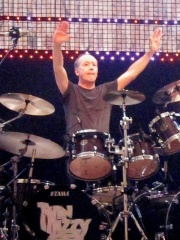
10. Brian Downey (b. 1951)
With an HPI of 53.20, Brian Downey is the 10th most famous Irish Musician. His biography has been translated into 17 different languages.
Brian Michael Downey (born 27 January 1951) is an Irish drummer. He was a founding member of the rock band Thin Lizzy and the only other constant in the band aside from leader Phil Lynott until their disbandment in 1983. Downey also co-wrote several Thin Lizzy songs. Allmusic critic Eduardo Rivadavia has argued that Downey is "certainly one of the most underrated [rock drummers] of his generation".
People
Pantheon has 21 people classified as Irish musicians born between 1934 and 1998. Of these 21, 16 (76.19%) of them are still alive today. The most famous living Irish musicians include Gilbert O'Sullivan, Bono, and Larry Mullen Jr.. The most famous deceased Irish musicians include Rory Gallagher, Dolores O'Riordan, and Ronnie Drew. As of April 2024, 1 new Irish musicians have been added to Pantheon including Fionnuala Sherry.
Living Irish Musicians
Go to all RankingsGilbert O'Sullivan
1946 - Present
HPI: 69.06
Bono
1960 - Present
HPI: 67.39
Larry Mullen Jr.
1961 - Present
HPI: 66.55
Sally Oldfield
1947 - Present
HPI: 59.98
Aphex Twin
1971 - Present
HPI: 58.99
Moya Brennan
1952 - Present
HPI: 58.33
Brian Downey
1951 - Present
HPI: 53.20
Sharon Corr
1970 - Present
HPI: 49.18
Louis Walsh
1952 - Present
HPI: 47.58
Jim Corr
1964 - Present
HPI: 47.18
Imelda May
1974 - Present
HPI: 46.92
Caroline Corr
1973 - Present
HPI: 46.77
Deceased Irish Musicians
Go to all RankingsRory Gallagher
1948 - 1995
HPI: 67.26
Dolores O'Riordan
1971 - 2018
HPI: 66.52
Ronnie Drew
1934 - 2008
HPI: 55.39
Paddy Moloney
1938 - 2021
HPI: 51.28
Liam O'Flynn
1945 - 2018
HPI: 46.76
Newly Added Irish Musicians (2025)
Go to all RankingsOverlapping Lives
Which Musicians were alive at the same time? This visualization shows the lifespans of the 5 most globally memorable Musicians since 1700.

